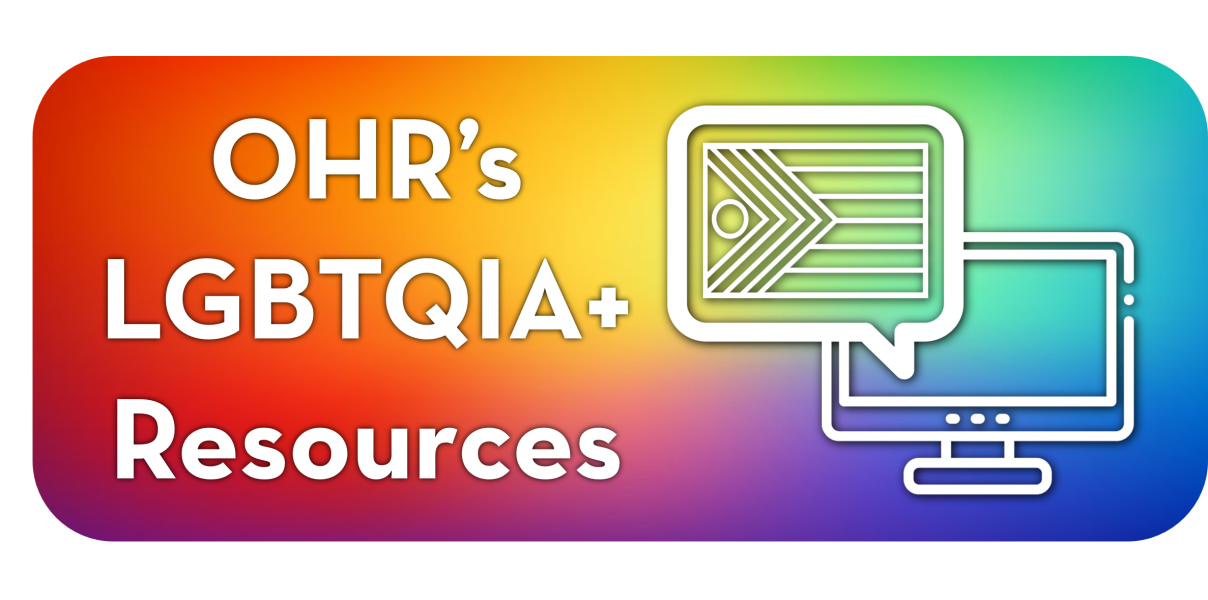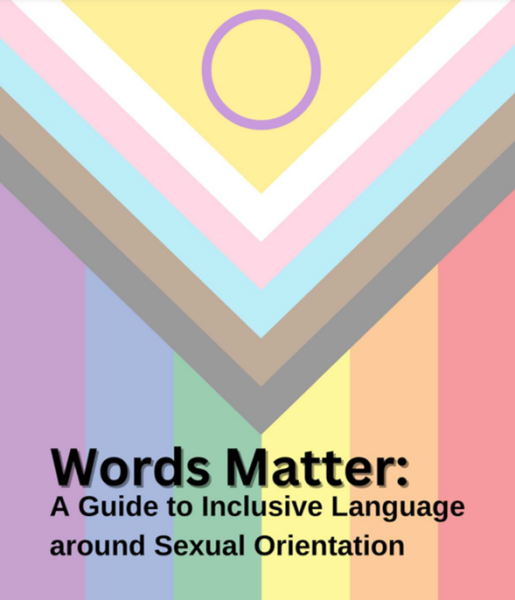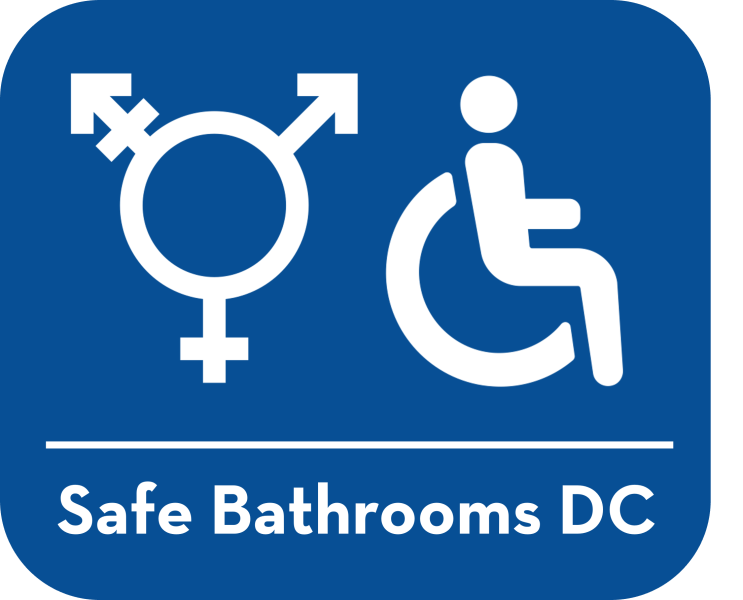Sections On This Page:
Protections for the LGBQIA+ Community
-
Being denied service at a hotel based on your sexual orientation.
-
Refusal of service at a restaurant based on your gender identity and/or expression.
-
DMV declining to change your gender marker on your license to non-binary.
-
Discrimination based on one or more of the 23 protected traits covered under the DC Human Rights Act (DCHRA). For more information, please see below.
Local and Federal Laws OHR Enforces
Individuals have the right to file a claim of discrimination regarding one or more of the laws below. These laws have been summarized for a better understanding for the community. However, please note that these summaries are for informational purposes only, as every discrimination complaint is unique and requires careful examination. Additionally, they must fit into one of the areas of jurisdiction (educational institutions, employment, housing, or public accommodations or government services). For further inquiries for consultations, please contact OHR directly.
-
The DC Human Rights Act of 1977 (DCHRA)
-
The DHCRA, prohibits discrimination based on one or more of the 23 protected traits. It aims to ensure equal opportunity and protections from discrimination in four areas: educational institutions, employment, housing, and public accommodations and government services. Some of special interest to the LGBTQIA+ community are:
-
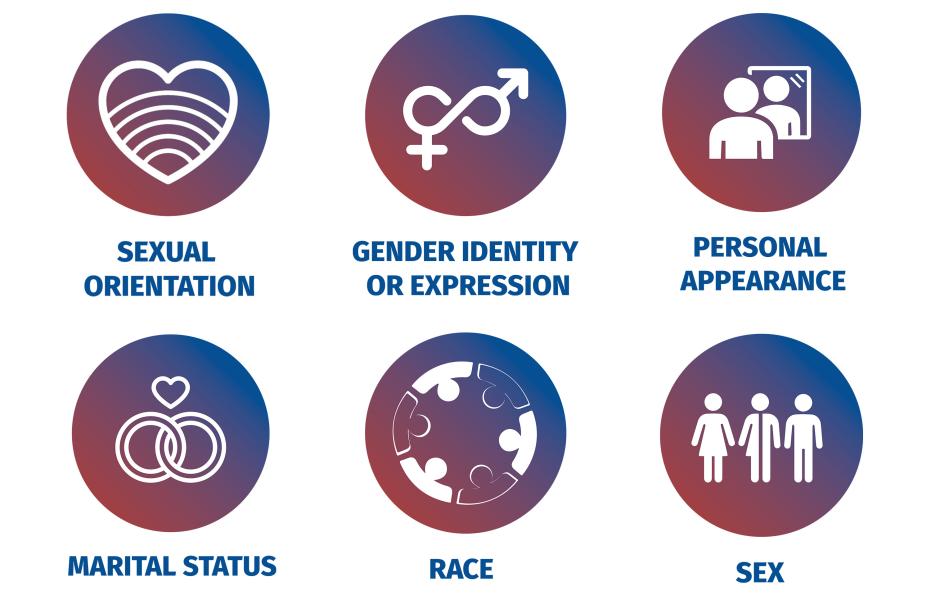
-
To explore definitions and the full scope of 23 Protected Traits in the other areas of enforcement, also in additional languages, please click here.
-
To file a complaint, please click here.
-
For more information, please visit the following:
-
-
Protections for LGBTQ Seniors and Seniors Living with HIV in Long-Term Care Facilities
-
The Act protects residents of long-term care facilities from discrimination and mandates equitable services and support for LGBTQ seniors and/or seniors living with HIV at a long-term care facility in Washington, DC.
-
Additionally, it also requires :
-
Long-term care facilities may not engage in or permit discrimination or harassment against an individual because of their actual or perceived sexual orientation, gender identity or expression, or HIV status.
-
Facilities must protect personally identifiable information such as a resident’s sexual orientation, gender identity or expression, transition history, and HIV status.
-
Facility employees must post in a visible location a notice stating it does not permit discrimination or harassment based on an individual’s actual or perceived sexual orientation, gender identity or expression, or HIV status.
-
-
To file a complaint, please click here.
-
For more information, please visit the following:
-
-
Rental Tenant Screening Violations
-
-
Parts of the Eviction Record Sealing Authority and Fairness in Renting Amendment Act of 2022, D.C. Code § 42-3505.10, also established a number of new requirements for District housing providers when they are screening potential tenants, including limiting the amount of fees a housing provider can charge during the application process and limiting the information a housing provider may request and consider during the screening process.
-
To file a complaint, please click here.
-
For more information, please visit:
-
-
-
Youth Bully Prevention Program
-
If a youth is experiencing bullying in a school, each school has a designated Bullying Point of Contact and you have a right to file a complaint and request an investigation. To find out who your school's Bullying POC is, visit this link . If you feel as though the school has violated the Youth Bullying Prevention Act or need additional support, contact OHR's Youth Bullying Prevention Program at [email protected] or call 202.519.3333. You may file a discrimination complaint if you believe you have been discriminated against in educational institutions based on a protected trait in DC.
-
File a Complaint of Discrimination
-
DC Human Rights Act of 1977
-
Educational Institutions
-
Amharic / አማርኛ (Print / ማተም)
-
Chinese / 中文 (Print / 版)
-
French / Français (Print / Imprimer)
-
Korean / 한국인 (Print / 인쇄)
-
Spanish / Español (Print / Español)
-
Vietnamese / Tiếng Việt (Print / Xuất Bản)
-
- English (Print) (Online)
- Amharic / አማርኛ (Print / ማተም)
- Chinese / 中文 (Print / 版)
- French / Français (Print / Imprimer)
- Korean / 한국인 (Print / 인쇄)
- Spanish / Español (Print / Español)
- Vietnamese / Tiếng Việt (Print / Xuất Bản)
-
Housing
- English (Print) (Online)
- Amharic / አማርኛ (Print / ማተም)
- Chinese / 中文 (Print / 版)
- French / Français (Print / Imprimer)
- Korean / 한국인 (Print / 인쇄)
- Spanish / Español (Print / Español)
- Vietnamese / Tiếng Việt (Print / Xuất Bản)
-
Places of Public Accommodation or Government Services
- English (Print) (Online)
- Amharic / አማርኛ (Print / ማተም)
- Chinese / 中文 (Print / 版)
- French / Français (Print / Imprimer)
- Korean / 한국인 (Print / 인쇄)
- Spanish / Español (Print / Español)
- Vietnamese / Tiếng Việt (Print / Xuất Bản)
-
-
Care for Seniors Act
-
Contact us with reports of violations at [email protected]
-
File a claim of discrimination:
-
Spanish / Español (Print / Español) (Online/en línea)
-
-
Rental Tenant Screening Violations
-
Youth Bully Prevention
-
Report a violation Report a violation by emailing b[email protected] or call 202.519.3333
-
File a claim of discrimination
-
-
Summary of OHR Education and Outreach Initiatives:
-
Protecting Your Pride and Safety:
-
Piloting at Black Pride in 2024, this program aims to allow simpler access to the LGBTQIA+ community in filing a complaint and learning about their rights. Posters are hung in LGBTQIA+ spaces, such as the Pride venue, cafes, nightlife venues and more, and have a QR code which individuals can scan to take them to this portal. We plan to expand this program for World Pride 2025 where an estimated 3 million attendees will have available access.
-
-

-
Words Matter: Inclusive Language Guides
-
OHR has created two guides to serve as educational resources for District employees and the public as they begin to engage more regularly in conversations about sexual orientation and gender identity and expression:
-
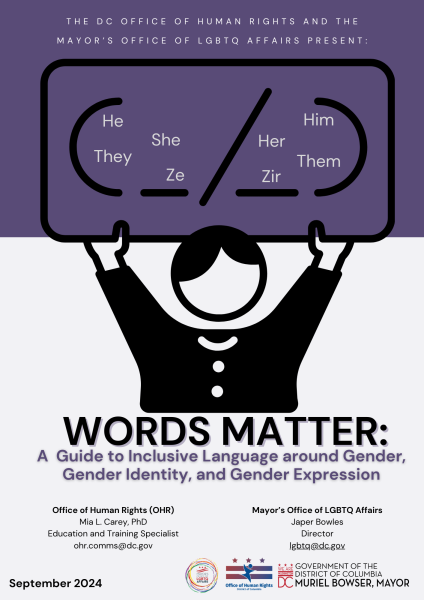
- As educational resources, they should not be construed as legal advice or as a mandate. These guides are not meant to be comprehensive and are considered to be living documents.
-
Best Practices in Celebrating Diversity in the Workplace
-
Celebrating Diversity in the Workplace: Best Pratices in DC Government (Gender Identity & Expression and Sexual Orientation) useful definitions and suggested best practices for interacting with colleagues and constituents within the LGBTQIA communities.
-
-
Safe Bathrooms DC
-
The Safe Bathrooms DC campaign, launched in April 2014, aimed to change the stress and even dangerous experience of using public restroom by making every single-stall public bathroom in the District gender-neutral. It is the law, but just like ten years ago, many business and unaware of the requirements. If you see a public bathroom with one stall that is not gender neutral, just tweet us the business name and location using #safebathroomsdc or fill out our five question form.
-
To learn more and get resources, please visit: Learn more and see the campaign ads.
-
-
Trainings:
-
OHR conducts various training on laws, issues, and general information for the LGBTQIA+ community. All OHR presentations emphasize OHR's jurisdiction in these matters and the protected traits under the DCHRA, as well as provide an overview of relevant local and federal legislation. Specific training sessions, such as 'Know Your Rights: The 23 Protected Traits in Washington, DC,' delve deeper into the laws and protected traits. Our partnerships with stakeholders and government agencies facilitate conversations to better understand these topics. A few groups we have trained include:
-
MOLGBTQ Affairs
-
WMATA
-
The DC Superior Courts
-
Gay Men’s Chorus of Washington, DC
-
Capital Pride Alliance
-
-
-
Listening Labs:
-
Listening labs allow OHR to connect with LGBTQIA+ community members concerns. They typically feature an informative segment followed by a listening session, during which attendees can confidentially share their feedback and insights. The data and findings collected from listening labs help plan future events and develop outreach materials, benefiting both OHR and its co-sponsoring agencies/groups.
-
-
Social Media and Website
-
OHR disseminates its vast resources and maintains an active presence on various social media platforms, including Facebook, Instagram, LinkedIn, YouTube, and Twitter/X. Initiatives like “Protected Trait Tuesday” campaigns aim to raise awareness issues facing the LGBTQIA+ community. Additionally, our social media content is integrated with OHR's website to provide comprehensive information and resources to the public.
-
The Violence Prevention and Response Team (VPART)
2000 14th Street NW, Suite 105 Washington, DC
20009 (202) 862-2245
[email protected]
Community Partnership
-
The DC Mayor’s Office of LGBTQ Affairs
-
The Mayor’s Office of Lesbian, Gay, Bisexual, Transgender, and Questioning Affairs (MOLGBTQ) was created through the Office of Gay, Lesbian, Bisexual and Transgender Affairs Act of 2005. The District of Columbia is and has been a leader in LGBTQ+ rights in the nation. The mission of the MOLGBTQA is to address the important concerns of the District’s lesbian, gay, bisexual, transgender, and questioning residents through empowering young LGBTQIA+ community leaders, removing barriers for LGBTQIA+ business owners, building a cohesive LGBTQIA+ community across all eight wards, and providing resources for at-risk LGBTQIA+ populations.
-
Location:
-
Frank D. Reeves Municipal Center, 2000 14th St. NW, Suite 101, Washington, DC 20009
-
-
Contact:
-
Phone: (202) 727-9493
-
Email: [email protected]
-
-
-
-
The vision of the Center for Black Equity is to establish a worldwide network comprising LGBTQ+ individuals, allies, community-based organizations, and Pride movements committed to realizing equality and social justice for Black LGBTQ+ communities. This is achieved through their pillars of Economic Equity, Health Equity, and Social Equity
-
Location:
-
1200 G Street NW Suite 810 Washington, DC 20005.
-
-
Contact:
-
To submit questions and messages, kindly use the fillable form available on their website.
-
-
-
-
The DC LGBTQ+ Community Center educates, empowers, uplifts, celebrates, elevates, and connects the lesbian, gay, bisexual, and transgender communities. To fulfill our mission, we focus on four core areas: health and wellness, arts & culture, social & peer support, and advocacy and community building.
-
Location:
-
2000 14th St. NW, Suite 105, Washington, DC 20009
-
-
Contact information:
-
Phone: (202) 682-2245
-
Email: [email protected]
-
-
-
-
The Wanda Alston Foundation is a nonprofit organization dedicated to providing housing and support services for LGBTQ+ youth experiencing homelessness in all eight wards within Washington, DC. Through shelter, resources, and advocacy, they strive to empower and uplift LGBTQ+ youth, ensuring they can thrive and lead fulfilling lives.
-
Main office location:
-
1377 R St NW Suite 200 Washington, D.C. 20009
-
-
Contact information:
-
Office: (202) 465-8794
-
Services: (202) 733-3643
-
-
-
-
Whitman-Walker Health is a Washington DC community health center specializing in HIV/AIDS care and lesbian, gay bisexual and transgender care.
-
Location:
-
Whitman-Walker at 1525 1525 14th St. NW Washington, DC 20005
-
Whitman-Walker at LIZ 1377 R St. NW, Suite 200 Washington, DC 20009
-
Max Robinson Center 1201 Sycamore Dr. SE Washington, DC 20032
-
-
Contact information:
-
Phone: (202) 745-7000
-
To submit questions and messages, kindly use the fillable form available on their website.
-
-
-
-
HIPS promotes the health, rights, and dignity of individuals and communities impacted by sexual exchange and/or drug use due to choice, coercion, or circumstance. HIPS provides compassionate harm reduction services, advocacy, and community engagement that is respectful, non-judgmental, and affirms and honors individual power and agency.
-
Contact information:
-
24 Hour Hotline: 1 (800) 676-4477
-
Email: [email protected]
-
-
-
-
For many young people, SMYAL provides the only safe space in their world. LGBTQIA+ youth are at greater risk than their heterosexual peers for many negative health outcomes, including HIV infection, violence, substance abuse, physical abuse, homelessness, and suicide.
-
Contact information:
-
Phone: 202.546.5940
-
Email: [email protected]
-
To submit questions and messages, kindly use the fillable form available on their website.
-
-
7. Additional Resources
-
OHR Annual Report:
-
-
OHR is required to annually report the progress of DC Human Rights Act enforcement to the Mayor and the Council of the District of Columbia. The report includes case dockets, case closures, and benefits achieved by successful complainants. Additionally, the Director reports other annual activities of OHR and the Commission on Human Rights, including community outreach, education programs, compliance programs, mediation, and fair housing.
-
-
-
-
This resource first published on September 29, 2016, is for employers as apart of ongoing work in the District of Columbia to reduce employment discrimination against transgender and gender non-conforming job applicants. It provides step-by-step instructions for employers, human resources professionals, and hiring managers to evaluate their hiring practices for discrimination based on gender identity and make changes as needed.
-



